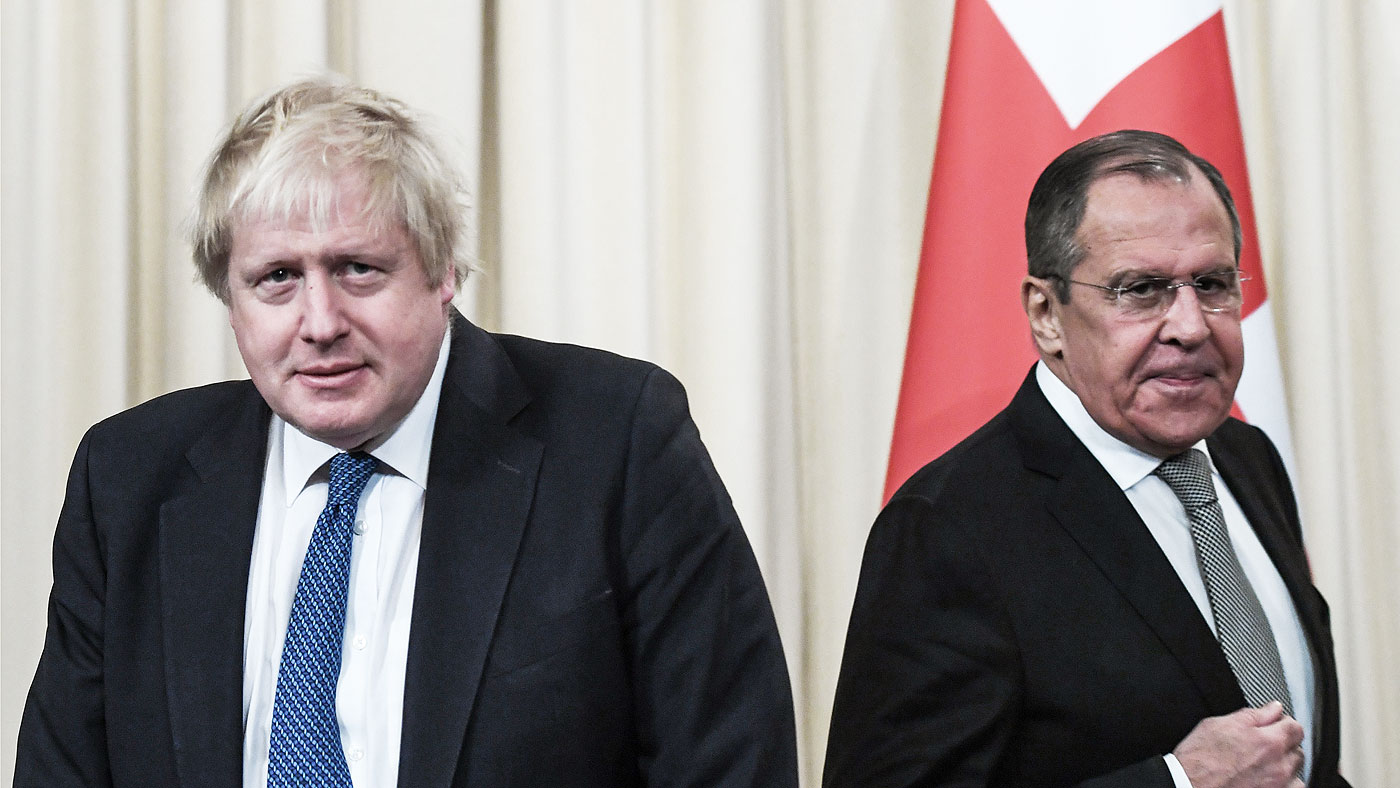Boris Johnson and Sergei Lavrov spar at fiery first UK-Russia meeting in five years
Analysts say visit shows Britain in a ‘state of profound confusion’ over Moscow relations

A free daily email with the biggest news stories of the day – and the best features from TheWeek.com
You are now subscribed
Your newsletter sign-up was successful
Foreign Secretary Boris Johnson and his RussiaN counterpart, Sergei Lavrov, have engaged in a fiery exchange during the first official visit to Russia by a British government minister in five years.
In bullish comments ahead of the summit, Johnson warned the Kremlin that Britain was “prepared and able” to launch massive cyberattacks in retaliation for Russia’s interference in Western democracy. Johnson also said that relations between the two nations “haven’t been so bad for a very long time” and that Moscow was behaving in a “more hostile way” towards Britain than at any other time since the Cold War.
The Guardian reports that Lavrov hit back during the meeting, saying: “It’s no secret that our relations are at a low point and that’s not at our initiative.
The Week
Escape your echo chamber. Get the facts behind the news, plus analysis from multiple perspectives.

Sign up for The Week's Free Newsletters
From our morning news briefing to a weekly Good News Newsletter, get the best of The Week delivered directly to your inbox.
From our morning news briefing to a weekly Good News Newsletter, get the best of The Week delivered directly to your inbox.
“We’ve noticed you and other Western countries have your reasons for this and you prefer to speak about them publicly. We would prefer to discuss these issues directly, not in public through microphones.”
Prime Minister Theresa May raised the stakes with Moscow last month when she claimed in a set-piece foreign policy speech that “the UK knew what Russia was doing”, and accused Moscow of “deploying its state-run media organisations to plant fake stories and Photoshopped images in an attempt to sow discord in the West and undermine our institutions”.
But Russian officials have mocked the paucity of the public evidence - a matter to which Lavrov drew attention at the meeting.
There have been a fews gaffes by Johnson during the trip.
A free daily email with the biggest news stories of the day – and the best features from TheWeek.com
At times, Johnson has appeared to be “on another planet”, The Daily Telegraph’s Russia correspondent tweeted. And when Lavrov complained about relations being at a low, Boris responded that he was glad there was an increase in exports of Kettle crisps.
Johnson’s visit highlights that the UK is in “a state of profound confusion” over Russia relations, “indicative of the inability to develop a consistent political course”, Alexei Zudin, from the Institute for Social, Economic and Political Studies, told state-funded broadcaster Sputnik Radio.
Fellow broadcaster Russia Today agrees, saying: “It’s unclear how BoJo really feels about Russia. His comments on the country range so widely from complementary to contradictory, even he doesn’t seem sure what he makes of Moscow. One minute he’s heaping praise on Russian President Vladimir Putin, the next he’s condemning anything that’s come out of the country.”
Moscow and London do have shared interests, including dealing with international terrorism and preventing terrorists from returning to their home countries from Syria. Both capitals are essentially “singing from the same songbook”, yet Russia is “a dominant partner,” British historian and Russia analyst, Martin McCauley told the broadcaster.
“Neither side expects any major breakthrough in the strained bilateral relationship, which has not been repaired since the murder of Alexander Litvinenko in London in 2006,” says The Guardian.
-
 Will increasing tensions with Iran boil over into war?
Will increasing tensions with Iran boil over into war?Today’s Big Question President Donald Trump has recently been threatening the country
-
 Corruption: The spy sheikh and the president
Corruption: The spy sheikh and the presidentFeature Trump is at the center of another scandal
-
 Putin’s shadow war
Putin’s shadow warFeature The Kremlin is waging a campaign of sabotage and subversion against Ukraine’s allies in the West
-
 Epstein files topple law CEO, roil UK government
Epstein files topple law CEO, roil UK governmentSpeed Read Peter Mandelson, Britain’s former ambassador to the US, is caught up in the scandal
-
 Iran and US prepare to meet after skirmishes
Iran and US prepare to meet after skirmishesSpeed Read The incident comes amid heightened tensions in the Middle East
-
 Israel retrieves final hostage’s body from Gaza
Israel retrieves final hostage’s body from GazaSpeed Read The 24-year-old police officer was killed during the initial Hamas attack
-
 China’s Xi targets top general in growing purge
China’s Xi targets top general in growing purgeSpeed Read Zhang Youxia is being investigated over ‘grave violations’ of the law
-
 Panama and Canada are negotiating over a crucial copper mine
Panama and Canada are negotiating over a crucial copper mineIn the Spotlight Panama is set to make a final decision on the mine this summer
-
 Why Greenland’s natural resources are nearly impossible to mine
Why Greenland’s natural resources are nearly impossible to mineThe Explainer The country’s natural landscape makes the task extremely difficult
-
 Iran cuts internet as protests escalate
Iran cuts internet as protests escalateSpeed Reada Government buildings across the country have been set on fire
-
 US nabs ‘shadow’ tanker claimed by Russia
US nabs ‘shadow’ tanker claimed by RussiaSpeed Read The ship was one of two vessels seized by the US military